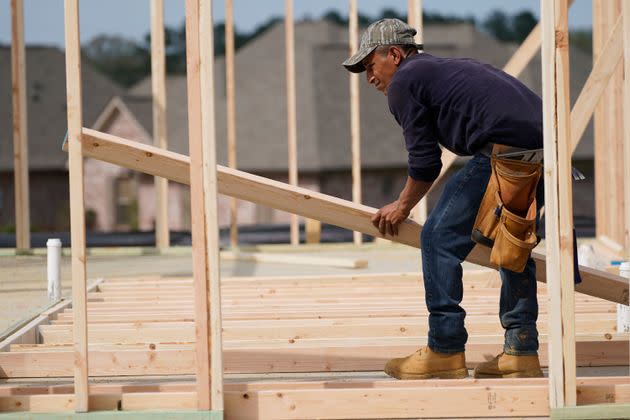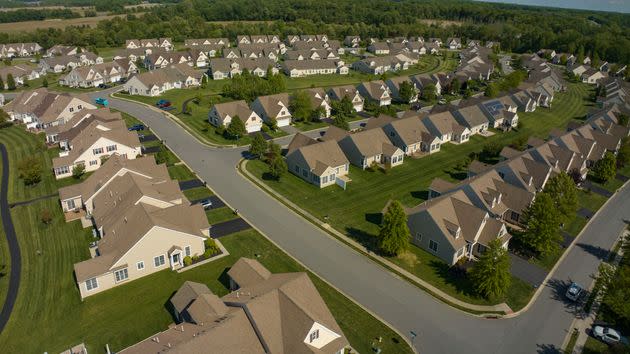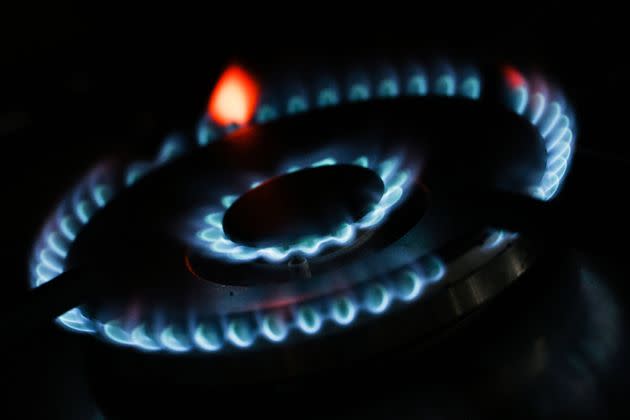The Industry ‘Scandal’ That Might Completely Upend How America Builds Houses

In this March 16, 2021 file photo, a carpenter aligns a beam for a wall frame at a new house site in Madison County, Mississippi.
Fossil fuel companies are trying to strip a series of climate-friendly measures out of the latest round of model building codes used to regulate construction virtually everywhere in the United States.
The International Code Council, the nonprofit organization responsible for writing widely adopted model building codes, broke its own rules to allow natural gas trade associations make the industry’s case for scrapping provisions for electric appliances and car chargers from the latest update to the codebook, HuffPost has learned.
Long accused of inappropriately chummy ties with the industries its rules regulate, the ICC late last year abruptly changed its own written policies to give the gas groups twice as much time to file appeals against codes they don’t like, and to skip a key bureaucratic step meant to provide oversight to avoid frivolous challenges, according to public documents and interviews with four sources with direct knowledge of the process.
The legitimacy of the entire building code system — already eroding, after recent changes to the process dampened hopes for more ambitious, greener codes — may now be at stake. Some experts involved in writing the latest codes say they may abandon the process altogether, in favor of forging a new national model that can more easily slash energy usage and cut back on planet-heating emissions.
The ICC had put a new approval process in place for energy codes in 2021, after industry groups balked at the most climate-friendly code in years. This new system put trade associations representing fossil fuel interests and real estate developers on equal footing with public officials from elected governments. Now, to advocates of stricter codes, it looks like the industry players are rigging the code-writing process even more.
“It’s a scandal,” said Mike Waite, the director of codes at watchdog American Council for an Energy-Efficient Economy and a volunteer who helped author this year’s commercial building codes.
“The ICC’s policies are crystal clear. They wrote them. Now they are violating them,” Waite said. “They think they can do anything and get away with it. And we know exactly who it’s benefiting.”
On Monday morning, ACEEE, the Natural Resources Defense Council and four other major energy-efficiency advocacy groups sent a letter to the ICC’s chief executive, Dominic Sims, urging him to cancel all upcoming hearings before the ICC appeals board. Groups like the American Gas Association and the American Public Gas Association planned to ask the ICC at those hearings to gut measures that make switching to electric appliances cheaper and easier for homeowners.
In a lengthy statement to HuffPost, the AGA said the rule changes would correct what gas companies saw as an imbalanced process during which, in the eyes of the utility trade group, the ICC violated its own rules to accommodate advocates of stricter codes.
The ICC defended changing its rules to allow for the gas industry’s challenge, but touted the energy-efficiency gains in its latest codebook and said it was wrong to assume the appeals board would rule on behalf of the fossil fuel companies.
Heating Up
In 2021, the United States spewed an average of nearly 17.4 million metric tons of carbon dioxide into the atmosphere each day. Try to picture where all that pollution comes from, and you’ll likely think of smoke stacks on a power plant, exhaust from the tailpipes of idled cars in traffic and oil rigs burning excess gas like candles on the Texas plain.
Add the ranch house with the white-picket fence to that list.

Modern row houses in suburbs of Delaware seen from elevated view.
Between the fossil fuels they burn directly and the electricity they require, buildings are tied with heavy industry as the biggest source of greenhouse gasses in the U.S.
For cities and towns across the country, this is a crisis. While many municipalities have adopted local laws mandating they zero out their emissions in the coming years, the rules to regulate the automobiles and power stations that generate much of the nation’s pollution fall under federal or state control. One thing local governments do have jurisdiction over, however, is how buildings are constructed.
Rules for building codes vary by state. In Colorado, for example, municipalities make their own decisions. In Illinois, statewide adoption of the latest and greenest codes is mandatory. In Idaho, towns are barred from going too far beyond the state’s standards, which are among the weakest in the nation. Almost half of the U.S. is now following the Gem State’s lead in passing statewide laws that make it illegal for any town or county to bar new buildings from using natural gas.
All but a handful of big states with the capacity to write complex construction codes, such as California, use model codes designed and updated every three years by the ICC, a nonprofit consortium made up of local government officials, industry groups and environmentalists. But until recently, only the government officials could vote on the final codes, granting the process democratic legitimacy and curbing how much power energy and construction groups had over their own regulations.
When the ICC convened its members in 2019 to begin working on the codes that came out in 2021, local government officials turned out to vote in larger numbers than ever and organized themselves to cast ballots in favor of the most ambitious codes in decades. With their votes, the ICC approved codes that were as much as 14 times more efficient than the previous code.
Outraged over rules they said would eat into profits and raise the cost of already-unaffordable housing, industry groups tried to overturn that vote. Gas utilities managed to get some of the most climate-friendly measures, like requiring new homes to include the wiring for electric appliances and car chargers, struck from the code. For the most part, however, the new, more stringent code held.
The ICC’s electoral process did not. Despite objections from local governments, environmentalists and even the newly-inaugurated Biden administration, the ICC eliminated its existing vote structure altogether.
Local governments would still get final say on most other codes, like those dictating swimming pools and plumbing. But energy-related codes would instead go to two “consensus” committees — one for residential, one for commercial — where industry groups and governments would need to compromise over the thickness of insulation and the wiring in buildings.
New System, New Problems
Problems quickly arose when the committees first met in early 2022 to start writing the code scheduled to go out in 2024. A secret email from a gas utility executive pressured a consensus committee chair to ax a proposal to require new buildings to be wired for electric vehicle chargers, even before the proposal came up for a vote, as HuffPost reported at the time.
Finding rules that engineers, gas utilities, home-builders, local governments and energy-efficiency advocates could all agree to under this new system proved challenging. ICC committee members serve as volunteers, and they now had to spend far more time debating and bargaining over code proposals than in previous years. For workers with local governments or a small firms, that kind of unpaid work could be difficult to carve out time for. Lobbyists working for trade groups did not have the same problem.

Flames can be seen on a gas stove.
When the residential committee first met, it was clear there were already warring factions. But as the volunteers started sorting through hundreds of code proposals in 2022, many passed within preliminary vote by simple majorities. It wasn’t until June that the ICC made clear that would-be codes would need to be approved by two-thirds of committee members in order to move on to the next phase.
It seemed impossible to pass anything. But Gayathri Vijayakumar saw an opening.
The principal mechanical engineer at a firm specializing in sustainable construction, Vijayakumar felt she could serve as the residential committee’s neutral negotiator, with the credibility to talk to both government workers who wanted stricter codes and industry groups concerned about how much it would cost.
“I’d been working already with folks with different viewpoints and I felt I had been able to understand both sides of arguments,” she said. “I was convinced that there was middle ground to be found on some of these contentious proposals.”
She began hosting forums in summer 2022 to figure out where the two sides could find compromise. When the committee formally came together for another preliminary vote of members present during the meeting on the compromise proposals in September that year, 32 members voted yes, eight voted no. When official electronic balloting took place soon after, the vote came in at 38 to 9.
The very existence of these forums constituted what the AGA called “irregular committee proceedings” that “limited transparency to the public, hindered opportunities for public comment on multiple occasions, and violated ICC procedures.”
“This resulted in proposals that would not have been considered for inclusion in the body of the code, being included as a requirement for code compliance,” Michael Murray, the gas group’s general counsel, wrote in an email to HuffPost. “Additionally, the balance of power between disparate interest groups was neither maintained nor transparent.”
In fall 2023, the ICC met and scheduled a final committee vote for November. The ICC’s rules allowed for 30 days to appeal. Despite reservations about the new process, groups like the ACEEE, which had wanted the next batch of codes to go further, still accepted the results of the process.
Then, just days before the window to object to the codes closed, the ICC abruptly pushed the deadline back by 30 days. No industry groups had filed any appeals before the original deadline. But a week later, appeals came in from the American Gas Association and the American Public Gas Association, which represent utilities; the Air Conditioning, Heating, and Refrigeration Institute, whose members include manufacturers that make gas-fueled equipment; and two housing industry associations.
Four local officials from New England and New York also filed an appeal claiming that the compromises that came out of Vijayakumar’s forums were reached in a way that’s “completely contrary” to how the committee was supposed to function. But the officials said the “ambiguity” in the ICC’s own internal policies “sets the stage to allow rules to be misconstrued and applied inconsistent with those procedures.”
“We have observed concerning discrepancies in the code development process, raising doubts about the legitimacy of the consensus approach,” they wrote in a letter appealing the energy codes to the ICC.
I find it deeply irresponsible of an organization that develops rules and whose members enforce them to essentially say: ‘Rules are made to be broken.’Mike Waite, ACEEE
The ICC said its internal announcements about when the period for appealing proposals “caused confusion for multiple parties.” So the ICC’s board of directors “chose to extend the deadline” for appeals “out of an abundance of caution.”
Russ Manning, the ICC’s senior vice president of technical services, said the extension was “consistent with the principles of due process that the Code Council prioritizes” and with its own internal rules.
“I find it deeply irresponsible of an organization that develops rules and whose members enforce them to essentially say: ‘Rules are made to be broken,’” Waite said when asked to comment on the ICC’s defense.
Yet even by accepting the appeals when it did, the ICC broke an internal rule. The ICC was supposed to run the appeals by the committees first to judge whether they merited hearings. Instead, the ICC simply scheduled the hearings without consulting the code authors at all.
The “clear” violations of the ICC’s own procedure mean the appeals should be tossed out without even holding a hearing, according to the environmental groups’ letter on Monday.
But Manning said the ICC “determined that sending the issues to the committees for further action would be unproductive, as it was unlikely to remove the appellants’ appeal and would unnecessarily extend the finalization of the 2024 versions of the codes.”
The appeals process was “in its beginning phases,” Manning said, insisting “there is no basis for concluding what the final” rulings will be. He pointed to an analysis by the Pacific Northwest National Laboratory that found the latest codes, as proposed, would raise energy efficiency by as much as 10%.
If the ICC actually grants the appeals, groups like ACEEE said they may begin looking at alternatives to the ICC to design codes and consider not participating in the next round.
Not everyone agrees it’s time for outrage just yet.
Duane Jonlin is head of the ICC’s energy committee and a codes official in Seattle widely considered to be among the nation’s most progressive. He said “it’s too early to be getting upset about appeals.”
“They’ll be ruled on,” he said. “Then we can talk.”
The appeals hearings are scheduled to take place over three days from Feb. 21 to 23. But the last day for anyone to register to attend or speak at the hearings is Monday.

